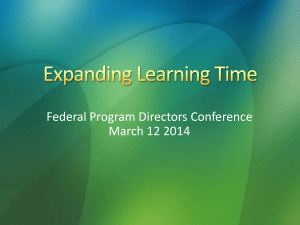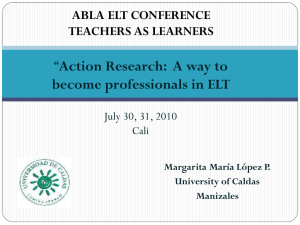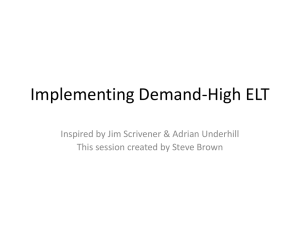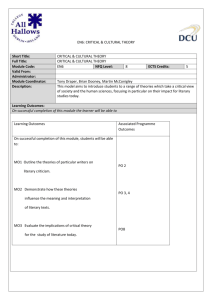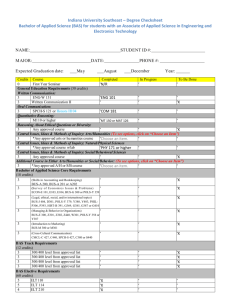MA ELT Programme APL Applied Linguistics
advertisement
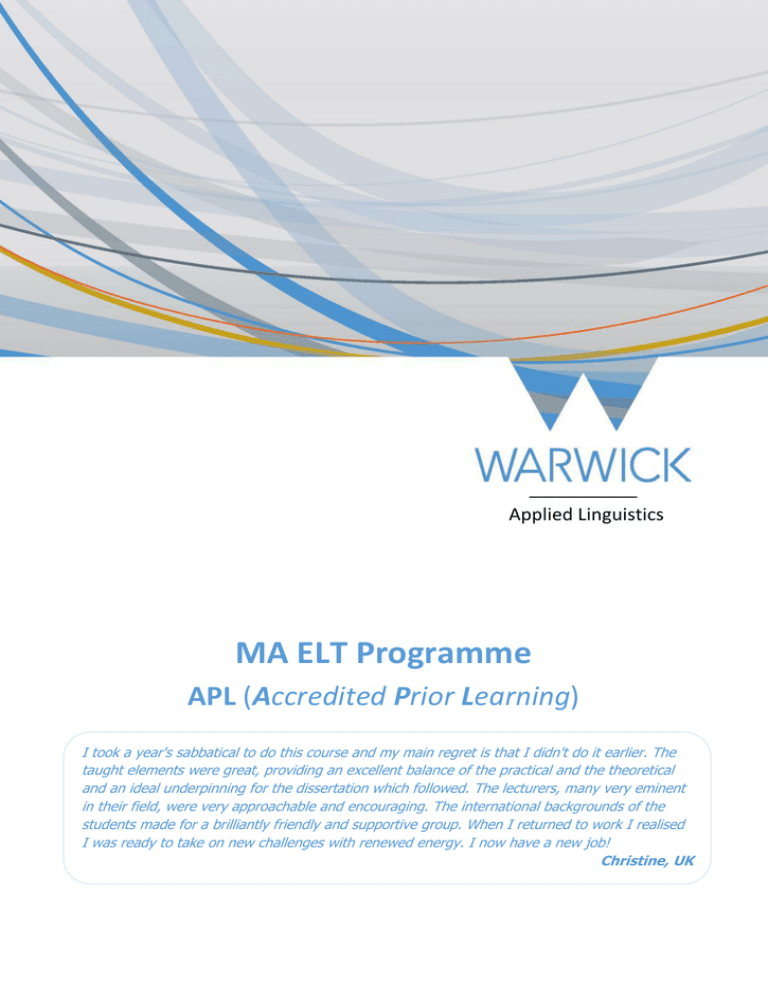
____________ Applied Linguistics MA ELT Programme APL (Accredited Prior Learning) I took a year's sabbatical to do this course and my main regret is that I didn't do it earlier. The taught elements were great, providing an excellent balance of the practical and the theoretical and an ideal underpinning for the dissertation which followed. The lecturers, many very eminent in their field, were very approachable and encouraging. The international backgrounds of the students made for a brilliantly friendly and supportive group. When I returned to work I realised I was ready to take on new challenges with renewed energy. I now have a new job! Christine, UK APL overview If you have a Diploma (DELTA) qualification you will be able to ask for ‘APL’ (accredited prior learning). In order to get an MA in ELT you need 180 credit points (CATS). The DELTA will give you 60 of these if you follow the MA ELT Generalist programme and 30 CATS for the other specialist programmes (English for Young Learners; English for Specific Purposes; Testing & Assessment; Teacher Education; ICT). This means you do not need to complete and do not have to pay for this part of the course. All APL students are exempt from two 15 CAT core modules in Term 1. These are: SLA (Second Language Acquisition) and Classroom Language Learning - ET990 Issues and Research in ELT (post-experience) – ET965 Only APL students on the MA ELT Generalist programme are exempt from one 30 CAT core module in Term 2. This is: Professional Practice in ELT – ET972 Diploma level professional qualifications recognised for APL Although there are numerous Diploma level professional qualifications, we only recognise the following: Diploma in TESOL (DELTA, Cambridge Assessment, University of Cambridge, formerly UCLES) Diploma TESOL (Trinity College, London LTCL) I chose Warwick due to both its excellent reputation in the field and the range of interesting modules on offer, including text and discourse analysis, educational management and teacher training. As I intended to study part-time, I was also impressed by the flexibility offered by the course. I feel that I have developed as a researcher and I am more confident in my ability to collect and then act on classroom data. I now apply what I have learned in my current position as an EAP lecturer. I am seriously considering returning at some point to embark on a PhD. Stephen, UK Frequently asked questions 1) Can I get APL for one of the specialist MA programmes? Yes, applicants who have a Diploma level qualification in ELT are exempt from 30 CATs of the following MA ELT specialist programmes: EYL (English for Young Learners) ESP (English for Specific Purposes) ICT (Information Communication Technologies) TA (Testing and Assessment) TED (Teacher Education) However, we cannot give APL for an additional 30 CATs in Term 2 for students following one of the specialist MA ELT programmes listed above because there is not a close match between DELTA content and the specialist Professional Practice modules in Term 2 they will need to take. * Please note that for the MA ELT (Generalist pathway), applicants who have a Diploma level qualification in ELT are exempt from 60 CATs of coursework on this programme: Term 1 (30 CATs): SLA (Second Language Acquisition) and Classroom Language Learning (ET990) and Issues and Research in ELT (ET965); Term 2 (30 CATs): Professional Practice in ELT (ET972). 2) Is it available as a distance-learning course? No, it is not currently available as a distance option. However, we try to be flexible in allowing you to achieve it over 2-4 years on a part-time basis. 3) Can I get APL for MA ELT (Studies and Methods)? APL will not apply to our MA ELT (Studies and Methods) programme as this programme is for pre-experience students. 4) Can I choose to follow the exempt modules if I want to? Yes – if class sizes permit, you may audit the modules but you will not be able to submit an assignment for assessment. ___________________________________________________________________________ The MA degree will deepen your theoretical knowledge about ELT, will help you develop a more robust understanding of theory-practice links, and will lead to improved prospects of promotion as well as job satisfaction. ___________________________________________________________________________ Further Information and Contact Centre for Applied Linguistics University of Warwick Coventry CV4 7AL, UK Tel: +44 (0)24 7652 3200 Email: appling@warwick.ac.uk Web: http://www.warwick.ac.uk/al
